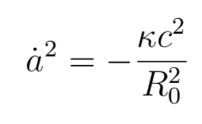So for a curvature only universe, the Friedmann equation becomes
and we get the solution $a(t) = t/to$, and $to = 1/Ho$.
If we calculate the proper distance today we will get
As $z-> infinity$, the proper distance today also approaches infinity.
Typical textbook would say something like, in this universe we could see things infinitely far away.
I understand that when a galaxy emits a light, as the light travels towards us that galaxy is moving away from us, thus the proper distance to that galaxy today would be larger than the distance to that galaxy when that photon was emitted. But how could that galaxy's proper distance be infinity today? The age of this universe is $1/Ho$, finite, how could that galaxy have travelled to infinitely far from us by today?


